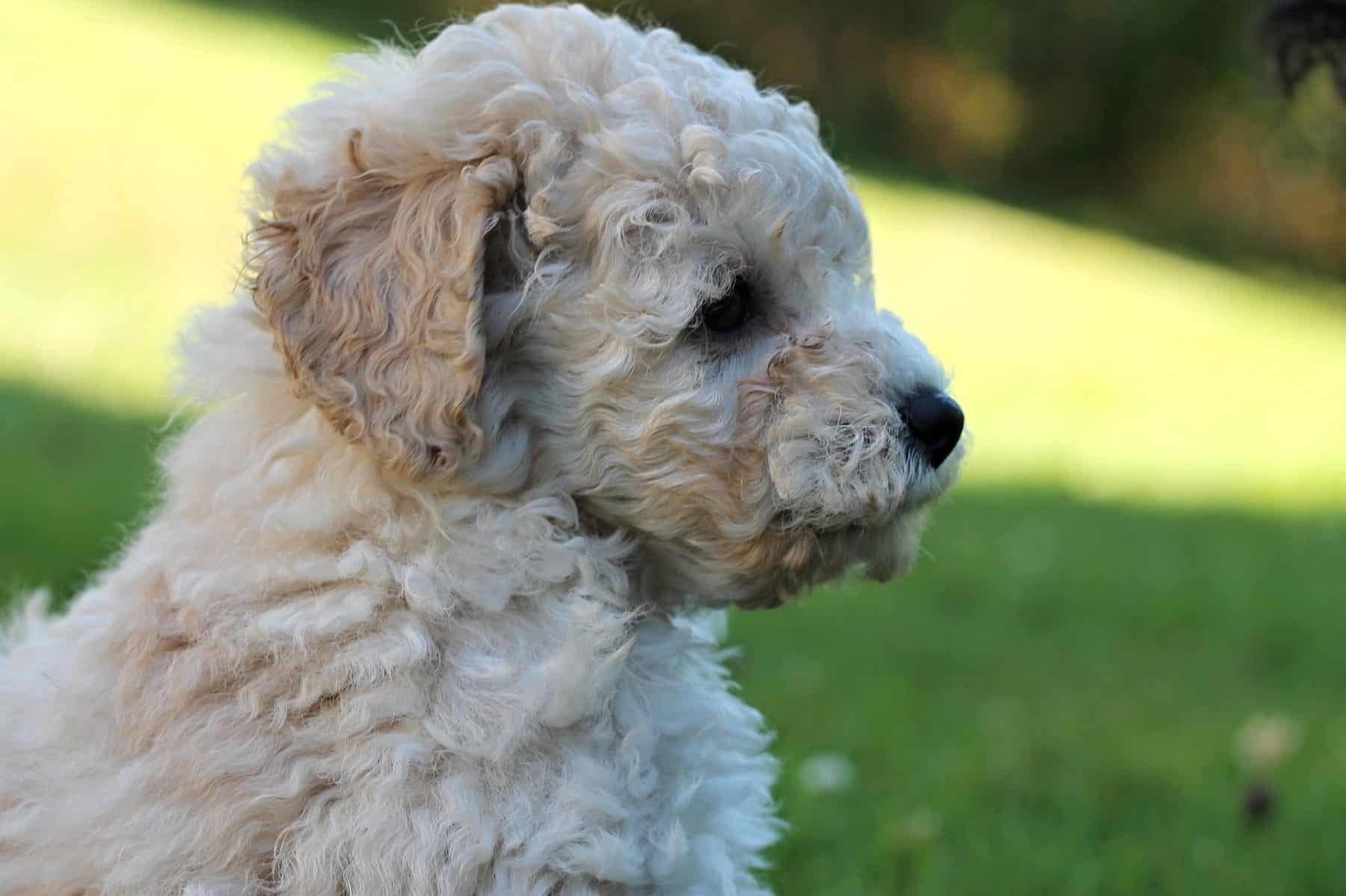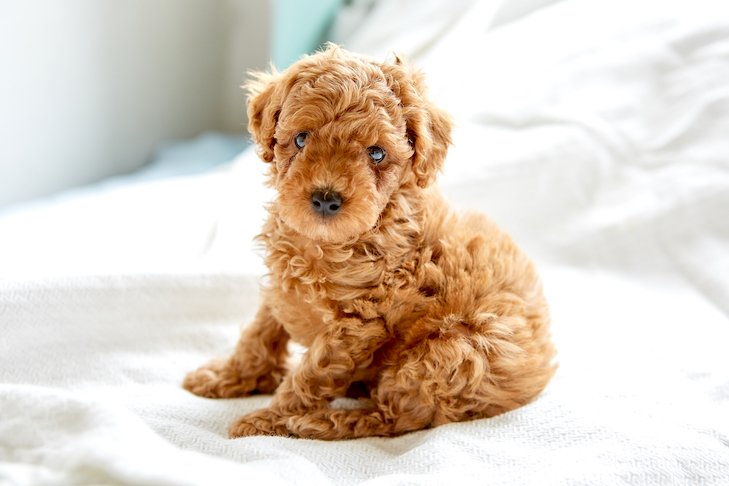Poodle puppies are a delightful mix of intelligence, charm, and playfulness. Did you know that poodles are known for their hypoallergenic coats and are often recommended for people with allergies? This unique trait makes them a popular choice for families searching for a furry companion who won’t trigger allergic reactions. Poodle puppies come in various sizes, including standard, miniature, and toy, catering to a wide range of preferences. With their distinctive curly fur, expressive eyes, and inherent grace, poodle puppies are truly captivating.
Originating in Germany, poodles were originally bred as water retrievers. Throughout history, they have become renowned for their intelligence and trainability. Poodle puppies are quick learners and excel in obedience training, making them highly versatile and adaptable pets. Moreover, their high energy levels make them great companions for active individuals and families who enjoy outdoor activities. With proper socialization and training, poodle puppies can grow up to be well-rounded and obedient dogs, forming strong bonds with their owners. If you’re looking for a loyal, intelligent, and beautiful addition to your family, consider welcoming a poodle puppy into your home.
Poodle puppies are known for their playful and intelligent nature. They are highly trainable and make great family pets. Poodles have a hypoallergenic coat, which is ideal for individuals with allergies. These puppies require regular grooming to maintain their beautiful coat. Poodles are also energetic dogs that need regular exercise and mental stimulation. They thrive on human companionship and make loyal and affectionate pets. Overall, poodle puppies are a delightful addition to any home.

The Journey of Poodle Puppies: From Birth to Adulthood
Poodle puppies are adorable, intelligent, and full of life. They bring joy and excitement to any household. But have you ever wondered how these charming puppies grow and develop into the elegant and sophisticated poodles we know them to be?
In this article, we will take a closer look at the journey of poodle puppies from birth to adulthood. We will explore their growth and developmental milestones, their physical and behavioral changes, and the care they require at each stage of their journey.
Join us as we unravel the fascinating journey of poodle puppies!
Stage 1: Birth and the Neonatal Period
The journey of a poodle puppy begins in the whelping box. Poodle puppies are usually born in a controlled environment like a breeder’s home or a veterinary clinic. At birth, the puppies are completely dependent on their mother for nourishment and warmth. They are blind, deaf, and unable to regulate their body temperature.
During the neonatal period, which lasts for the first two weeks of their lives, poodle puppies primarily sleep, eat, and snuggle with their littermates and mother. Their main developmental focus during this stage is on growing and gaining weight.
Mother poodles play a vital role in ensuring the survival and well-being of their puppies during this stage. They provide them with milk, groom them, and keep them clean. The mother’s presence and care are essential for the healthy development of the puppies.
Stage 2: The Transitional Period
After the neonatal period, poodle puppies enter the transitional period, which typically lasts from two to four weeks of age. This is a crucial stage in their development as they begin to explore their environment and interact with their littermates.
Poodle puppies’ eyes and ears start to open, allowing them to see and hear the world around them. They also start to engage in play behavior, testing their coordination and social skills. This is when they begin to wag their tails, play with toys, and learn from their littermates.
As poodle puppies become more mobile, they start to transition from crawling to walking. They also start to experiment with solid food, although they still rely on their mother’s milk as their primary source of nutrition.
Stage 3: Socialization and Learning
Around four to twelve weeks of age, poodle puppies enter the critical socialization period. This is a crucial time for their mental and emotional development, as they are receptive to new experiences, people, and environments.
During this stage, it is important to expose poodle puppies to a variety of sights, sounds, smells, and social interactions. Positive experiences during this period can help shape their temperament, confidence, and behavior as adults.
Poodle puppies should be introduced to different people, animals, and situations in a safe and controlled manner. This can include visits to the veterinarian, walks in the park, and playdates with other dogs. Early training and socialization can set the foundation for a well-behaved and well-adjusted adult poodle.
Stage 4: Adolescence and Adulthood
As poodle puppies enter adolescence, they go through a phase similar to human teenagers. They may exhibit signs of independence, rebellion, and testing boundaries. It is important to remain consistent with training and provide them with guidance and structure during this period.
Physical and hormonal changes occur during adolescence, with poodle puppies reaching sexual maturity between six to twelve months of age. Spaying or neutering is often recommended to prevent unwanted behaviors and health issues.
By the time poodle puppies reach adulthood, usually around one year of age, their growth is complete, and they have developed the elegant and distinctive appearance associated with poodles. They are intelligent, active, and loyal companions who thrive on mental and physical stimulation.
Understanding the Care Requirements of Poodle Puppies
Now that we have explored the journey of poodle puppies from birth to adulthood, let’s delve into the care requirements for these charming companions.
Nutrition and Feeding
Poodle puppies require a balanced and nutritious diet to support their growth and development. Consult your veterinarian for recommendations on the appropriate type and amount of food for your puppy.
Dietary needs may vary depending on the size, age, and activity level of your poodle puppy. Providing high-quality puppy food and dividing their meals into several small portions throughout the day can help prevent digestive issues.
Exercise and Mental Stimulation
Poodle puppies are active and intelligent dogs that require regular exercise and mental stimulation. Daily walks, play sessions, and interactive toys can help fulfill their physical and mental needs.
Engaging in activities such as obedience training, agility training, and puzzle toys can keep poodle puppies mentally sharp and prevent destructive behaviors that may arise from boredom.
Grooming and Coat Care
Poodles have a curly coat that requires regular grooming to keep it clean and free from tangles and mats. They do not shed like many other breeds, but their hair continues to grow, which means regular brushing and haircuts are necessary.
It is essential to develop a grooming routine and introduce your poodle puppy to the grooming process early on. This can include brushing, bathing, nail trimming, and dental care.
Comparing Poodle Puppies with Other Breeds
When it comes to energy level, intelligence, and trainability, poodle puppies are often considered among the top breeds. Let’s compare them to a few other popular dog breeds:
Labrador Retriever vs. Poodle
Both Labrador Retrievers and Poodles are known for their intelligence and friendly nature. However, Labrador Retrievers tend to have a higher energy level and may require more exercise compared to poodle puppies. Poodles, on the other hand, may be more adaptable to different living situations.
German Shepherd vs. Poodle
German Shepherds and Poodles are both highly intelligent breeds, but they have different temperaments. German Shepherds are known for their loyalty and protective instincts, while Poodles are often more outgoing and social. Poodle puppies may be easier to train due to their eagerness to please.
Bulldog vs. Poodle
Bulldogs are known for their calm and laid-back personalities, while poodles are more active and energetic. Poodle puppies may require more mental stimulation and exercise compared to Bulldogs. Both breeds may require special attention to grooming, with poodles needing more frequent maintenance due to their curly coat.
Conclusion
Poodle puppies are a joy to have, and watching them grow and develop is a remarkable experience. From their vulnerable early days to their graceful adulthood, these intelligent and elegant dogs never cease to captivate us.
Understanding the various stages of a poodle puppy’s journey can help us provide the care and support they need to thrive. From providing proper nutrition and exercise to grooming and socialization, each aspect contributes to their overall well-being.
Whether you already have a poodle puppy or are considering bringing one into your life, remember that their journey is one filled with love, learning, and companionship.
Key Takeaways – How Are Poodle Puppies?
- Poodle puppies are known for their intelligence and trainability.
- They require regular grooming to maintain their unique coat.
- Socialization is important to help poodle puppies grow into well-behaved adult dogs.
- Poodle puppies need plenty of exercise to prevent them from becoming bored or destructive.
- Proper nutrition is essential for the health and development of poodle puppies.
Frequently Asked Questions
Poodle puppies are known for their unique appearance and playful nature. If you’re considering getting a poodle puppy or if you already have one, you may have some questions about their care and behavior. In this FAQ, we’ll address some common inquiries about poodle puppies.
1. What is the best way to train a poodle puppy?
Training a poodle puppy requires consistency, positive reinforcement, and patience. Start with basic commands such as sit, stay, and come. Use rewards like treats or praise to motivate your puppy. It’s important to establish a routine and practice short training sessions regularly. Enrolling your poodle puppy in a puppy obedience class can also be beneficial, as it provides socialization opportunities and professional guidance.
2. How often should I groom my poodle puppy?
Poodles have a dense, curly coat that requires regular grooming to prevent matting and keep their fur healthy. Brush your poodle puppy’s hair daily to remove any tangles and prevent knots from forming. Additionally, schedule professional grooming sessions every 4-6 weeks to trim their hair, clean their ears, and ensure proper hygiene. Regular grooming not only keeps your poodle puppy looking good but also helps maintain their overall health.
3. Are poodle puppies suitable for families with children?
Yes, poodle puppies can be great companions for families with children. They are generally friendly, intelligent, and adaptable. However, it’s important to supervise interactions between poodle puppies and young children, as puppies can become overwhelmed by rough play. Teach your children to handle the puppy gently and to respect their boundaries. Early socialization and obedience training are also crucial to ensure that your poodle puppy grows up to be well-behaved around both children and adults.
4. How much exercise do poodle puppies need?
Poodle puppies are energetic and require daily exercise to keep them physically and mentally stimulated. Aim for at least 30 minutes to an hour of exercise every day, which can include walks, playtime in a secure backyard, or interactive games. Keep in mind that poodle puppies have different exercise needs depending on their size and age. Be sure to consult with your veterinarian to determine the appropriate amount and type of exercise for your poodle puppy.
5. Are poodle puppies prone to any specific health issues?
Like all dog breeds, poodles can be prone to certain health issues. Common health concerns for poodle puppies include hip dysplasia, progressive retinal atrophy (PRA), and von Willebrand’s disease. Regular veterinary check-ups, a balanced diet, and appropriate exercise can help minimize the risk of these conditions. It’s important to choose a reputable breeder who conducts health tests on their breeding dogs to ensure the overall health and well-being of the puppies.

Overall, poodle puppies are adorable, friendly, and intelligent. They make great companions for people of all ages.
With their hypoallergenic coats and minimal shedding, poodles are also a good choice for individuals with allergies. They require regular grooming to keep their curly fur looking its best.
